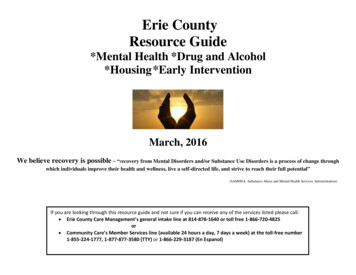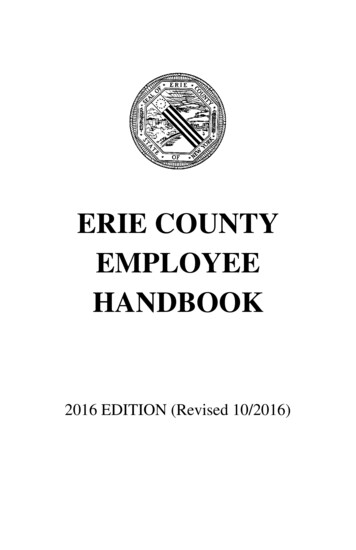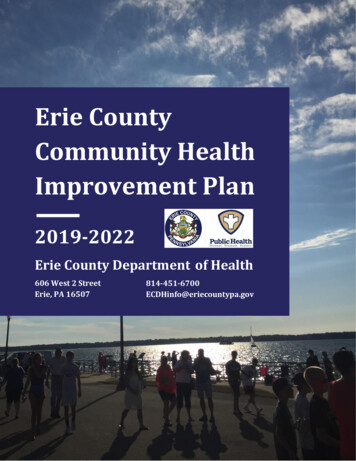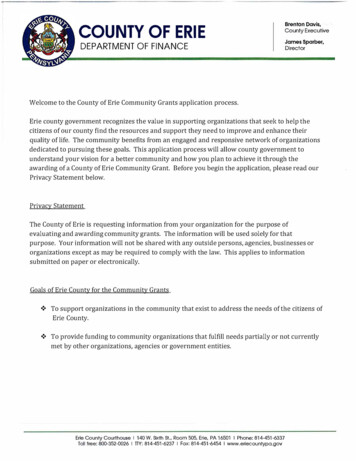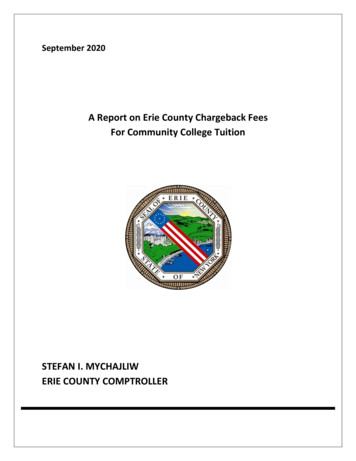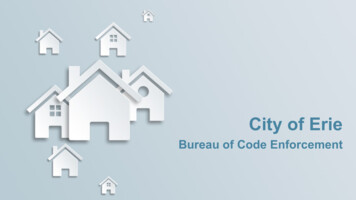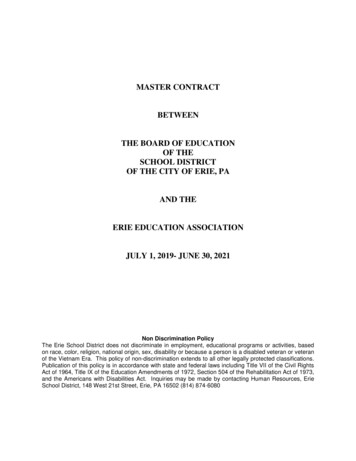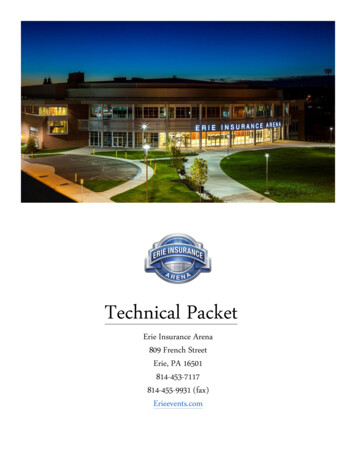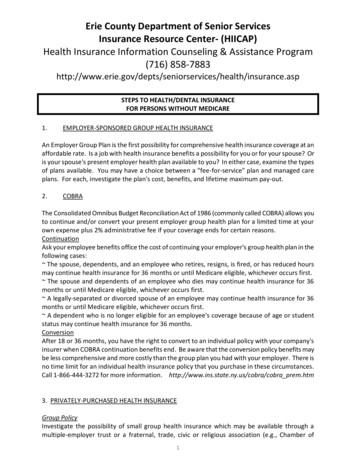
Transcription
Affordability. Accessibility. Flexibility.We have the ability to change our community’s future.Erie County Community CollegeA Proposal for the Establishmentof a Public Community Collegein Erie County, PennsylvaniaSubmitted to:The State Board of Education333 Market StreetHarrisburg, PA 17126-0333Submitted by:The County of Erie140 West Sixth Street, Room 116Erie, PA 16501-1081June 2017
Table of ContentsIntroduction. Page 4Historical Project Evolution. 4An Application and Call to Action. 4Target Programming. 5A Better Future for Erie County. 5Chapter 1: Background. 6Purpose and Objectives. 6Process. 6Local Sponsor. 7Guidance Documents. 7Report Organization. 7Chapter 2: Study Service Area. 8The Region. 8Transportation. 8Land Use. 9Sector Strengths. 9Study Area Defined.10Geographical Characteristics.10Population.10General Population Demographics.11General Population Distribution.11Population Trends.12Population Forecast.12Effect of Population Increase/Decrease on Need for Proposed Community College.14Transportation Infrastructure.14Roadway System.15Public Transit.16Aviation.17Port of Erie.18Railroads.18Traditional Utility Services.18Broadband Service.18Area Media and Communications.19Population — Demographic and Educational Trends.20Education.20Employment.21Human Resources.22Community College Enrollment Projections.22Chapter 3: Results of Survey Research.23Introduction.23Headlines.23What did the research show?.24Proposed Community College Analysis.262
Chapter 4: Philosophy, Objectives and Organization of the onsorship of the College.31Board of Trustees.32Organization of College Administration.32Draft Policies.33Administration Policies of the College.33Academic Policies.34Student Related Policies.35Tuition and Fees Policies.35Financial Aid Policies.35Course-Related Policies.35Personnel/Human Resources.36Personnel Handbook.36Non-Discrimination.36Affirmative Action and Equal Opportunity Employer.37Sexual Harassment.37Drug Free Workplace.37Facilities and Site Selection.37Criteria.37Erie County Site Selection Criteria Location.38Facility ent Services.40Financial Aid Counseling.40Orientation.40Counseling and Guidance.40Placement Services.40Follow-up Studies.40Program Offerings.41Pennsylvania College Credit Transfer System.45Digital Learning.47Projected Opening Enrollment.47Chapter 5: Financial Operations of the Community College.49Introduction.49Revenues.49Student Tuition.49State Support.49Local Support.49Proposed Budget for Start-up Period.50Pre-Year One Budget.50Budgets for Following Years of Operation.5110-year Capital Plan.53Conclusion.533
IntroductionThis application meets the requirements of the State Board ofEducation and Pennsylvania Department of Education for astand-alone community college proposed for Erie County. TheErie County Community College, if approved, would meet theneeds of the region’s residents for years to come — whetherthey attend the college and go on to further their education,or learn key skills to help them launch or restart their careers.A community college could serve as a catalyst for economicgrowth by offering a path to a more promising future forthousands of local people from high school students earningcollege credits to older citizens gaining new, marketable skills.Empower Erie, a nonprofit organization, was establishedwith the specific mission to do the research, outreach andconsensus-building required to open a viable communitycollege in Erie. Funding to study the feasibility andAn application and call to actionThis community college report serves as a formal application fora community college, as well as a vital call-to-action for moreaccessible and affordable post-secondary education as a meansto lift an entire community that has faced significant socioeconomic challenges. A community college will provide the skillsand training that people need to qualify for high skill jobs thatpay a living wage. It will provide employers with a pipeline ofpromising and talented applicants who can help drive growth andbetter business results. And it will play a vital role in stemmingthe brain-and-talent drain that has resulted in far too many peopleleaving the Erie community for opportunities elsewhere.viability of a community college includes 300,000 providedcollectively from the Erie Community Foundation, the ErieCounty Gaming Revenue Authority and the Susan Hirt HagenFund for Transformational Philanthropy. In addition, ErieCounty Council committed 60,000 to study the feasibilityof the community college. Upon approval of the communitycollege plan, it is projected that no additional tax revenuewill be required to fund the college. The Erie CommunityFoundation has promised 3.7 million would be available forstart-up and operational costs. In addition, further fundingis anticipated through an estimated 2.95 million in existinggaming revenue funds, as well as nearly 1 million more ingaming revenue funds expected to be available in 2021. Withthe funding from these revenue streams, Erie County projectsthat the Community College can operate without the need forany real estate tax revenue to fund it.options to everyone. Erie County, with an estimated populationof 276,000 (and nearly 100,000 in the city), is the most populouscommunity in the state that does not benefit from the uniqueofferings of a stand-alone community college.Being locally based and accountable, a community college inErie County can fully focus on meeting the unique needs andaspirations of the communities it serves. The priorities of thecommunity college will reflect the priorities and needs of theErie community. Programmatically, the community collegecan base its offerings and services on thoroughly researchedneeds identified by the local governmental, business, education,healthcare and community leaders across the Erie community.Currently, 14 community colleges operate in the Commonwealthof Pennsylvania, offering affordable and flexible education4
Targeted programmingA community college in Erie County can offer programmingtargeted at meeting the needs of a variety of stakeholders in thelocal community.college would help Erie County and the region’s residentsreach their potential. The feasibility study’s data and narrativepaint a picture of Erie County at a definitive crossroads in itseconomic development. The community clearly faces manyreal and significant challenges. Yet, also emerging is somethinginspirational: a growing sense of possibility backed by actionoriented leadership.The programming would include everything from Associate andTargeted Programming to certificate training programs, fromnot-for-credit short coursesto developmental/remedialeducation, from appliedtraining and workforcedevelopment to wraparoundsupport services and careercoaching, from economicdevelopment support forbusiness to avocationaland recreational coursesand community serviceopportunities.The comprehensive feasibilitystudy that was conductedfor the community collegelooked at programming,but among other points,it also showed that theErie views itself proudly as a maker city–its people definethemselves as hard working and steadfast in the face of adversity.Erieites are undeniably resilient, and now their grit is beingtested during this period of renewal as they retool, retrain, andband together behind strategies that support a brighter future.Erie residents are proud of their affordable quality of life closeto Presque Isle State Park on Lake Erie, geographic proximityto their larger, neighboring markets in Cleveland, Buffalo, andPittsburgh, as well as an impressive host of cultural amenities nottypically found in a county of Erie’s size.Anchored by a wave of energetic, committed leaders, Erie isseeing light on the horizon through strategic investments frombusinesses and foundations into key sectors as well as a renewedcommitment to revitalization and growth in key industrysegments such as healthcare (hospital and education), insurance,stabilization of the manufacturing industry, and tourism.The cover of the 543-pagefeasibility study.A better future for Erie CountyA collective vision of a better future is gaining traction withinkey sectors and demographics of the community. The feasibilitystudy research affirms that a stand-alone community college isan essential component of that future.an economic and educational future supported by a vibrantcommunity that will link all these pieces together.We are confident that the following report not only meetsthe State Board of Education and Pennsylvania Departmentof Education requirements for a community college, but alsomakes a rock-solid case for how that college can serve as atransformative catalyst for a more promising future for ourentire community.It is true that the nearly decade-old effort to generate thenecessary political support for a community college fellshort. This time, however, is different. The political will andcommunity support to establish a community college in Erienow exists. Driving thatcooperation is a sharedunderstanding of the growingneed for a community collegeas one of the essential pillarsof a broader effort to addressthe range of challenges facingErie.A strong economy relies on amultitude of industry sectorsworking in partnershipwith a highly trained andeducated workforce. Thepeople of Erie County haveseen what the economy lookslike without a communitycollege, and they are eagerto set a course toward5
Chapter 1: BackgroundPurpose and ObjectivesThe objectives of this application are to concisely present thefindings derived from a community college feasibility studyand to propose a plan for a community college to serve ErieCounty based on the results of that study.Pennsylvania. Parker Phillips, an Erie-based consulting firmwith employees in Pennsylvania and Minnesota, conducted theErie County Community College Feasibility Report, releasedin May 2017. The feasibility study focused on Erie County, butthe Community College expects to draw from Crawford andWarren counties, as well as other communities in the region.Erie County managed the extensive research process andcoordinated the necessary community input and professionalexpertise to develop this application.This application has been completed pursuant to TheCommunity College Act of 1963 (PL1132, Act 484) thatprovides the requirements and guidelines for the establishmentof a community college. The research methodology utilized bythe feasibility study to determine the demand and need for acommunity college incorporated the methods outlined in theGuidelines for the Establishment of Public Community Collegein Pennsylvania (“Guidelines”), updated in August 2016.The workforce development research process institutedthrough the study process can, and will, be replicated overtime to reexamine the regional employers’ workforce needs.We will use what we learn not only to shape and continuallyinform a community college, but also to shape the county’sbroader business retention, expansion, attraction, andeconomic development efforts.The outreach and scope of the feasibility study follow therequirements of the Guidelines. The study, among its manyfindings, examined the employment and workforce profileand the Community College’s programmatic needs to evaluatethe potential for a community college to serve northwestProcessAdvocates for a community college in Erie County knew fromthe start that a strategic and thoughtful approach emphasizingconsensus-building and participation in the process was criticalfor a proposed community college to become a reality in ErieCounty. To that end, Erie County, a non-profit organization, wascreated to be a catalyst for change in Erie County by advocatingfor a community college as a key driver to advance the nextgeneration of Erie’s workforce and improve Erie’s overalleconomic landscape.every aspect of the project, including the progress of severalworking groups, as well as all aspects of a feasibility study, proforma financial plan, and economic impact study. All meetingswere structured and included an agenda and meeting minutes.In addition, a concerted outreach campaign was launched thatresulted in a series of endorsements and demonstrations ofsupport from a wide range of community stakeholders. Resultsfrom this outreach campaign included resolutions passed bythe City of Erie School District and other municipal and schooldistrict bodies, as well as endorsements from several local laborunions. Erie County’s extensive community outreach programalso included working closely with existing colleges and highereducation organizations to assure greater cooperation and todevelop programming that is not duplicative and meets thecurrent and ongoing needs of the community. Transparency hasalso been another critical element throughout the process. Inorder to be as transparent as possible, Erie County’s website hasmade project documents, the full research study, presentations,community college information resources, and Commonwealthdocuments available. Local media has been actively followingour progress from the inception of the research throughthe development of this application, reaching thousands ofresidents throughout Erie County.Erie County applied for and received the Erie CommunityFoundation’s Shaping Tomorrow Grant, which specificallycharged the Erie County team to establish a community collegein Erie, Pennsylvania. The Erie Community Foundation, TheSusan Hirt Hagen Fund for Transformational Philanthropy andthe Erie County Gaming Revenue Authority jointly awarded 300,000 to Erie County to study the feasibility of creating astand-alone community college. In addition, upon approvalof the study, another 3.7 million will be made available toimplement the community college plan.With seed money and the promise of significant fundingsecured, Erie County launched its strategic plan to lay thegroundwork to gain broad support and perform the duediligence necessary to make a community college a reality. ErieCounty assembled a 9-member volunteer board of directorsconsisting of educators, community leaders, attorneys andsocial service professionals to serve as leadership team and thedecision-making body for the effort. The board has met on aweekly basis and devoted countless hours to discuss and reviewUltimately, the process that was established allowed for an indepth analysis of the need for a community college while alsosystematically building widespread support for a communitycollege that will meet the needs of students and employers,while providing long-term benefit to the entire community.6
Empower Erie’s Web Site.Local SponsorErie County will serve as the legal sponsor of the proposedcommunity college. As the local sponsor, Erie Countyrepresents the cities of Erie, Corry and all the townshipsand boroughs located within the boundaries of the county.Erie County Council will serve as the governing body ofthe local sponsor. The Board of Trustees will govern theproposed community college as required under Pennsylvania’sCommunity College Act of 1963.1Guidance DocumentsThe documents listed below served as guiding documents forthis application: The Pennsylvania Code, Chapter 335. Community CollegeCourses Guidelines for the Establishment of Public CommunityColleges in Pennsylvania The Pennsylvania Code, Chapter 31. General Provisions,§§31.2, 31.21(a)(b)31.23, 31.24(c), 31.52, 31.6, 31.31, 31.71, and31.72 The Pennsylvania Community College Act of 1963, §§ 1901-1918 The Pennsylvania Code, Chapter 34. Branch Campuses forState-Supported Institutions The Pennsylvania Code, Chapter 35. Community CollegesReport OrganizationThis application follows the sample topical outline providedin the Guidelines for the Establishment of Public CommunityColleges in Pennsylvania, issued by the Department ofEducation. Throughout the application, readers will find1breakout boxes to help them find key information. In addition,references will be provided to help readers find statisticalinformation that corroborates the narrative text.More information about governance of the proposed community college may be found in Chapter 4 of this application.7
Chapter 2: Study Service AreaThe RegionErie County, divided into 38 municipalities, is located in thenorthwest corner of Pennsylvania, and is the Commonwealth’sonly link to the Great Lakes. On the north, it is bordered byLake Erie and Canada; on the northeast by New York; on theeast by Warren County; on the south by Crawford County; andon the west by Ohio.1TransportationBecause of its unique geographic location, Erie County hasbecome the largest metropolitan area and dominant economiccenter in northwest Pennsylvania and the tri- state region.Its location along Lake Erie and its proximity to Cleveland,Pittsburgh, and Buffalo provide strategic transportationadvantages. The county is served by an efficient multi-modal12transportation system, including three interstate highways,mass transit facilities, an extensive railroad network, twoairports, and a commercial port.2 A more extensive descriptionof Erie County’s transportation infrastructure can be foundlater in this chapter.Pennsylvania State Data Center, Pennsylvania County Data Book 2016: Erie County, p. 1.Ibid., p. 1.8
Land UseLand use in Erie County is diverse, including large urbanand suburban development as well as small rural centersand agricultural and
Erie County Community College Submitted to: The State Board of Education 333 Market Street Harrisburg, PA 17126-0333 Submitted by: The County of Erie 140 West Sixth Street, Room 116 Erie, PA 16501-1081 June 2017 A Proposal for the Establishment of a Public Community College in Erie County, Pennsylvania
